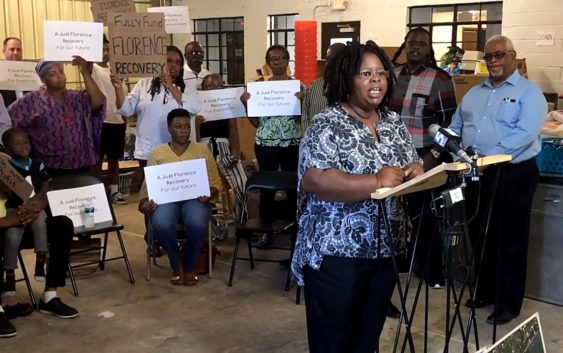- Seven months after Hurricane Helene, Chimney Rock rebuilds with resilience
- Wildfire in New Jersey Pine Barrens expected to grow before it’s contained, officials say
- Storm damage forces recovery efforts in Lancaster, Chester counties
- Evacuation orders lifted as fast-moving New Jersey wildfire burns
- Heartbreak for NC resident as wildfire reduces lifetime home to ashes
NC leaders approve $850 million for Hurricane Florence recovery. How will they spend it?

College students, small business owners, families with young children and rural hospitals and fire departments are just some of those now eligible for hundreds of millions of dollars in state hurricane recovery money.
The N.C. General Assembly voted Monday night to approve $850 million in Hurricane Florence relief, including $400 million that can be spent right away and $450 million that state leaders will decide in the coming months how to spend. That’s on top of the $50 million legislators approved last week for initial disaster response efforts.
“This is really an historic response to an historic crisis,” said Rep. Nelson Dollar, a Cary Republican and a top budget-writer in the state legislature.
Democratic Gov. Roy Cooper’s budget director, Charlie Perusse, said officials think Hurricane Florence caused nearly $13 billion in damage in North Carolina. Newly approved state funding will go a long way in adding to the federal recovery funds, he said.
Although Cooper and the legislature’s Republican leaders have frequently clashed, Perusse said that was not the case here.
“We know that rebuilding North Carolina stronger and smarter is a team effort and I want to commend you,” he said.
Much of the money approved Monday night is for construction, to repair schools in the storm’s path or to give loans and grants to private citizens to rebuild their homes or businesses. Other funds are for more specialized purposes — to help people with the little things that suddenly become so important when a hurricane destroys their homes, cars or crops.
There’s money to give displaced families child-care subsidies, and there’s money to expand the number of people who qualify for government-backed home loans from the North Carolina Housing Finance Agency.
There’s money to help people replace prescriptions or medical equipment they lost in the storm.
There’s money to fund additional mental health care in disaster-stricken areas, anticipating a spike in hospital visits.
There’s money for farmers and fishermen whose livelihoods were affected.
And there’s money for college students who lost a vehicle or textbooks or suffered some other damages.
Dollar said it was especially important to help low-income college students in disaster-stricken areas, “so they can continue their education journey, whether it’s a university or a community college.”
Many of the people who were hit by Hurricane Florence this year were hit by Hurricane Matthew in 2016 — and in many cases are still awaiting their federal money from the storm two years ago. But not all of the damage overlapped between the two storms, and legislators said Monday that they wouldn’t take away Matthew recovery funds to pay for Florence recovery efforts.
“Matthew should stand on its own,” said Sen. Brent Jackson, a Republican from Duplin County, which suffered major damage in both storms.
In addition to short-term repair grants, the state will also spend millions more on a fund that helps the federal government build more affordable housing projects through the Section 8 program.
Government officials will also have the money to buy out some homeowners in flood-prone areas, although there is concern that people will turn down the offers because the money they’d be eligible for wouldn’t be enough to move anywhere else.
“My concern is when we buy someone out … their buyout may not even allow them to have affordable housing,” said Rep. Charles Graham, a Democrat who represents the hard-hit area of Lumberton. “Their home’s tax value might not be sufficient to allow them to move to another area.”
Concerns like that were among the list of things legislators say they can discuss further starting Nov. 27, a few weeks after the elections, when they return to Raleigh.
Among other issues, that late-November session is expected to focus on how to start spending pieces of the $450 million that lawmakers have put in reserve.
Doran: 919-836-2858; Twitter: @will_doran